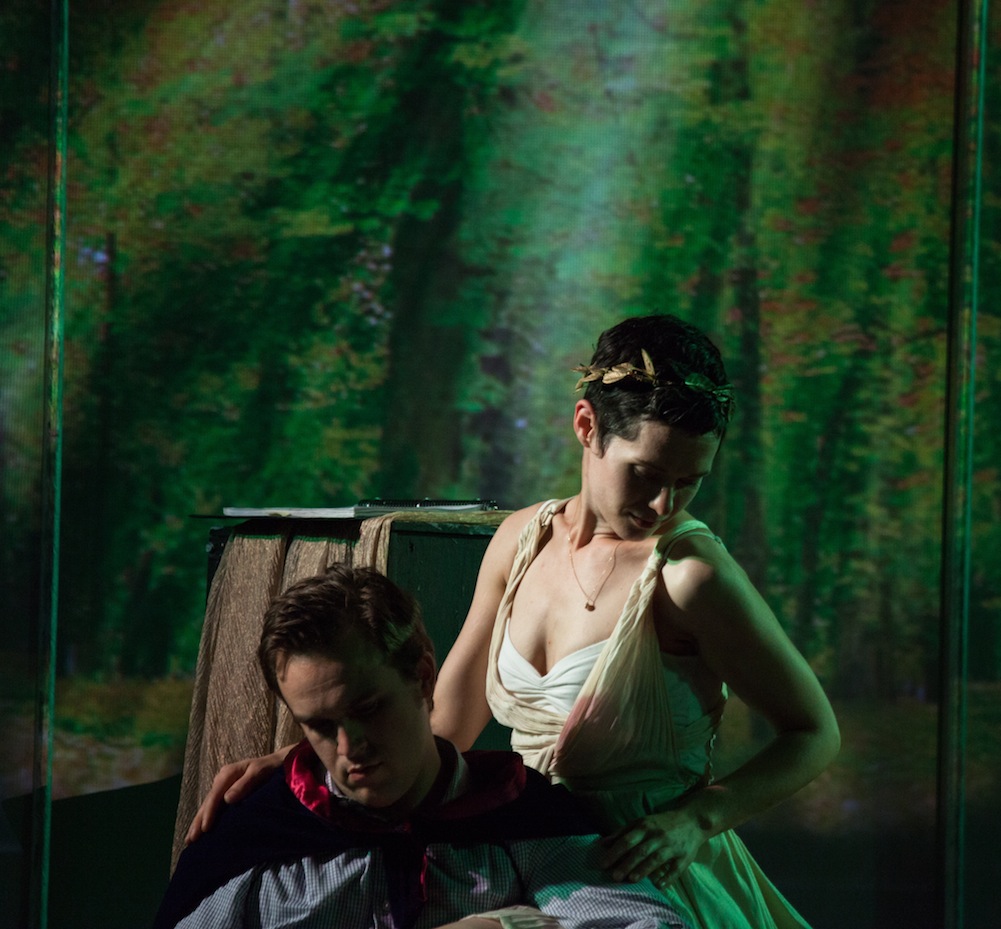Hugo Kauder’s “Merlin” receives its belated world premiere in New Haven

Emily Marvosh as Viviane and Samuel Levine in the title role of Hugo Kauder’s “Merlin,” which received its world premiere Sunday in Connecticut. Photo: Andrew Leu
His students remembered him as a polymath and consummate pedagogue. Lessons with Hugo Kauder, one of his American pupils recalled, lasted three hours and often covered a wide range of subjects beyond music.
The composer (1888-1972) was self-taught and self-guided, coming of age in the Vienna of Arnold Schoenberg before moving to the U.S. in 1940. But he eschewed atonality and considered it unnatural. Instead, as his prolific output shows, he developed a musical style based on rich tonality and Renaissance-style polyphony rooted in his own understanding of the natural world.
Though Kauder’s music is little known, the Hugo Kauder Society is doing much to remedy that. At Trinity Lutheran Church in New Haven, Connecticut Sunday afternoon, the Society presented the world premiere of the composer’s only opera, Merlin.
Kauder worked on Merlin for over a decade, starting in the mid-1950s, and not completing the opera until 1966.
The story provides a slight twist on a familiar legend. The libretto, by German philosopher Rudolf Pannwitz, tells of the prophetic Merlin as he councils several kings (Vortigern, Pendragon and Uterpendragon) to bring peace between the warring pagans and Christians. But by accident, he falls for the seductive Viviane. As love between the two blossoms, she longs to know the ways of magic. Merlin, going against the wishes of his master Blasius, teaches Viviane the secret Magic of Death, which she uses to trap Merlin in a whitethorn bush. Thus, the wizard can never return to the kingdom now peacefully ruled by Artus.
The complex machinations of the plot, in Sunday’s performance, proved hard to follow. In lieu of a full translation of the German text, English summaries were projected onto a backdrop screen. Delivery wasn’t always timely with long stretches of singing and dialogue passing before the corresponding descriptions would appear.
And they were often too brief and too vague. One supertitle merely read “Hero, Merlin!’ during a particularly lengthy aria early in the opera. Listeners had to rely on their German skills, however fluent or rusty, to fully grasp what Merlin and the other characters were up to. Most problematic, though, the maladroit summaries proved a distraction and made it difficult for the audience to fully appreciate the flow and subtlety of Pannwitz’s libretto.
Fortunately, Kauder’s well-crafted and appealing music was there to fill in the gaps. The composer’s musical textures are largely contrapuntal, his orchestrations warm and transparent. And the vocal lines flowed easily due to his expressive text setting, based on the natural rhythms and inflections reminiscent of Debussy’s Pelléas and Mélisande.
Bringing a particular shine to Kauder’s score were two charming singers in the lead roles. Tenor Samuel Levine proved a fluent and robust Merlin. And mezzo soprano Emily Marvosh’s sterling voice beamed in the role of Viviane. The two also acted with fine, dynamic chemistry in their duets.
Strong performances also came from baritone Christopher Herbert, who offered a full and resonant tone in dual roles as the Christian kings Pendragon and Uterpendragon, and baritone Isaac Grier, who rendered the pagan Vortigern with a stately voice.
As Merlin’s mentor Blasius, tenor Anthony Webb sometimes lacked power to match the orchestration. But he put across the role of Gavan, a knight who appears in the opera’s final scene, with more focus and force. Mezzo-soprano Toby Newman, as a young Merlin in the opera’s prelude, seemed to have the most problems with balance. Her milky voice unfortunately drowned beneath the waves of the orchestral brass.
Other weaknesses were minimal. At times in the first act, the chorus suffered from wavering pitch and uneven blend. But they fared better in the second when they achieved a more solid ensemble sound. The chamber orchestra played with control and expression and only rarely missed a strong attack. Throughout, Adrian Slywotzky conducted the ensemble of musicians and singers with steady energy and sensitivity.
Beth Greenberg’s economic staging of simple props, costumes, and colorful projected imagery did plenty to establish Merlin’s fantastical world.
But it was the energetic music that won the day. And this performance of Merlin is more than enough for listeners to pay Kauder’s music more serious attention. hugokauder.org